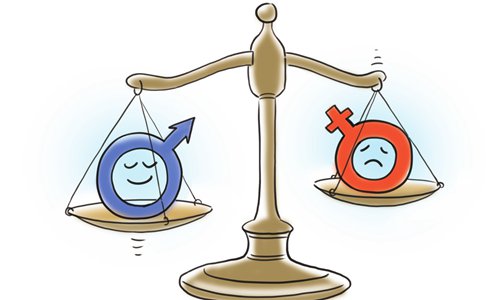
Illustration: Liu Rui/GT
Recently, several high-profile and trendy feminist movements quickly spread across different countries on social media, along with eye-catching blowups of sexual harassment scandals of political and business elites. The #MeToo online campaign encouraged women and girls to stand up and let the rest of the world realize how serious and prevalent sexual harassment is in our everyday life.
Meanwhile, from the UK to the US, more and more politicians and business leaders have been found guilty of sexual misconduct and forced to resign. Last week, senior directors of Oxfam, UK’s leading humanitarian charity, were exposed by the British press. They are said to have used earthquake survivors for sex in Haiti. The girls were even asked to wear Oxfam T-shirts to provide services in the director’s luxury house in the country after the disaster. Similarly, UN peacekeeping forces have been repeatedly accused of sexually exploiting underage girls in conflict zones and exchange sex for food and money.
What made the public even more furious is that the first responses from the UN and Oxfam were to ignore or cover up the stories. This is only the tip of the iceberg of a blowout of pandemic sexual harassment from politics, business to sports, from UK cabinet ministers, American lawmakers to sports doctors of Olympic gold-medal winners. Most of these men resigned from their positions. In an extreme case, one US republican state representative committed suicide after denying sexually assaulting a teenager.
It seems while women have more awareness and become more vocal, men become more and more silent and isolated from the feminist movements and discourse. This is clearly not the best solution to worldwide gender inequality. Besides “naming and blaming,” do we have better ways to add gender inequality into the agenda of national and international policies? More importantly, how could we engage and even empower men in the feminist movement and discussion?
Without any doubt, it is urgent to address gender inequality, not only sexual protection, but also equal work for equal pay. However, if we turn feminist movements into radical ideological campaigns without the possibility of open discussion and shared concern from another gender, it would be less effective to engage men to accept, participate in and support gender equality movements. The following observations on the current feminist movements in Europe and America may deserve more attention from us to address a pro-women approach of feminist movements.
First, the overwhelming majority of speakers, participants and audiences of current feminist campaigns are still women. From political campaigns, public parades, lectures, talks, discussions to training programs, feminist movements seem to primarily target women and jettison the role of men in addressing gender inequality. The voices of men are by and large silenced and excluded from many feminist campaigns. Instead of only educating women to respect women, probably a more inclusive approach is to educate and encourage both genders to realize the importance of gender equality in our society and end undermining the contribution of women. For example, women’s empowerment and leadership programs could have a more balanced gender representation to gradually encourage and mobilize male leaders in promoting gender equality.
Second, media attention on prominent female leaders is disproportionally focused on their gender identity, instead of functionality in their respective domains. In recent years, gender-related glass ceilings were broken in many political, business and academic positions. These female leaders quickly came into the spotlight as role-models of young women. However, most interviews and reports on female leaders are gender-related, such as how to empower and help other women, how to balance work and life (role of wife and mother), and how to reduce gender discrimination. But less attention is paid to their achievements and vision as leaders.
While these gender-related questions are highlighted, the contribution of these female leaders to their organizations is shadowed or even ignored. It seems that their role is only to solve the gender issue as a female leader. This reinforces, rather than breaks the social stereotyping of gender roles in society. Gender-focused media reports may also lead to criticism of feminist political campaigns: women occupying senior positions primarily because of their gender, not competence. It would instead dwarf the talent, courage and hard work of these extraordinary women which actually deserve more attention than just being women.
In the end, as feminism becomes part of “political correctness,” it may reduce the incentives for men to express their views and participate in gender-related discussions. For some men, this is intimidating. As women, we have better ways to encourage men to contribute to feminist movements. It is important to let men realize a more empowered women workforce would make the world a better place and they would be more willing and respectful to help women achieve their life goals.
Feminist movements are at different stages across countries. While the agenda of feminist campaigns in Europe are ambitious and aggressive, women in developing countries are still in the early stages of their movements. The content and definition of feminism also varies. Women in developing countries are still fighting for their basic rights, such as the battle against domestic violence, employment discrimination and childcare provisions for single moms.
The author is an independent researcher and political consultant. Previously, she worked at the UN Headquarter in New York. opinion@globaltimes.com.cn
